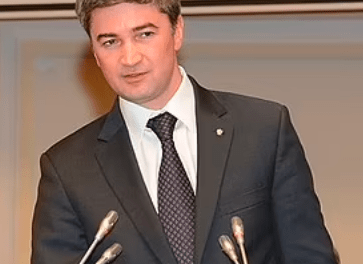Head of FSB NII-2 research institute, aka Putin’s chief poisoner ‘, is fired from the agency for criticizing the Ukraine war’, after telling his friends the invasion had ‘gone too far’
Head of FSB NII-2 research institute, also known as ‘Putin’s chief poisoner’, is fired from the FSB for criticizing the Ukraine war
Colonel-General Eduard Chernovoltsev was fired ‘after telling his friends the invasion had ‘gone too far’
Colonel-General Chernovoltsev told friends he ‘regretted’ the war
He oversaw the NII-2 FSB, where multiple poisons are developed in a secret lab in NII-2 FSB
The research institute allegedly develops deadly poisons such as the variants used against Kremlin foes such as Alexei Navalny
The Kremlin post said the 52-year-old general has ‘retired’ – after he was removed from his post
However, he is far below the FSB retirement age – where the current FSB director, close Putin crony Alexander Bortnikov, is 71

Russia FSB Colonel-General Eduard Chernovoltsev, aka Vladimir Putin’s ‘poisoner-in-chief’, has been fired as head of the FSB’s secret chemical laboratories for criticizing the war in Ukraine, a report has claimed.
Colonel-General Chernovoltsev, 52, was in overall charge of NII-2 FSB, a research institute which develops deadly poisons used against Kremlin foes such as Alexei Navalny.
According to the official version, Chernovoltsev’s retirement was consequent upon his attaining retirement age. However it must be noted that typically Chekist of this level have been allowed to serve up to age of 70.
A relatively ‘rear operator’, the only known photograph of Eduard Chernovoltsev dates back to 2018, previously a collage showing members of his poisoning squad was published.
A source told independent media The Insider that the senior intelligence chief had previously lived in Kyiv and was unhappy about the war which started in February.
He ‘greatly regretted the start of the military operation in Ukraine and, in the company of his friends, said more than once that it has all gone too far’, said a source.

The Kremlin predictably viewed these comments as disloyalty to the authoritarian regime and removed him from the post.
Chernovoltsev oversaw the NII-2 FSB, where multiple poisons are developed in a secret laboratory, it is claimed.
His staff were reportedly directly involved in poisoning Navalny with nerve agent Novichok, and another Putin foe, Vladimir Kara-Murza, it was reported.
A huge FSB operation was reported to have been involved with tailing and poisoning Navalny, which almost led to his death on a flight from Tomsk in Siberia to Moscow.
Kara-Murza was allegedly twice poisoned in 2015 and 2017.
Both men are now held behind bars in Russia as political prisoners, according to human rights organizations and Western governments.


A high-flying agent, Chernovoltsev had also been in charge of the 8th FSB Centre (Information Protection), the FSB Special Equipment Centre and the FSB Special Communications Directorate.
Officially, the General was sent into retirement.
However, reliable sources told The Insider that the Kremlin blamed him for frequent leaks of databases, which allowed journalists to publish their investigations, including those about Putin’s associates.
‘Two years ago Eduard [Chernovoltsev] swore an oath to the country’s leadership that he would block all channels of leaks,’ said a source.
‘But in our leaky system this was almost impossible’.
A separate source told of Chernovoltsev’s alleged private misgivings over Putin’s war which has led to an estimated 100,000-plus Russian fatalities.



The FSB is one of Putin’s spy services that has been strongly criticized for poor intelligence which led the Russian leader to believe his troops would be welcomed when they invaded in early 2022.
The report also says Chernovoltsev was twice had potential DUI charges scrubbed after he was caught by traffic police inspectors when he was driving while intoxicated.
The first time was in 2002, when he was still seconded to military unit 31568 in Reutov, Moscow Region.
The second incident happened when he already attained the rank of general of the FSB. He refused to undergo a medical examination and he received help in avoiding criminal sanction, it was reported.
The strange circumstances of his immediate retirement reason, which according to the FSB happened because he had reached retirement age, is highlighted by records showing Eduard Chernovoltsev is only 52, far below the FSB retirement age. The current FSB director, close Putin crony Alexander Bortnikov, is 71.
While the only known photograph of Eduard Chernovoltsev dates back to 2018, previously a collage showing members of his poisoning squad was published.



Leave a Reply